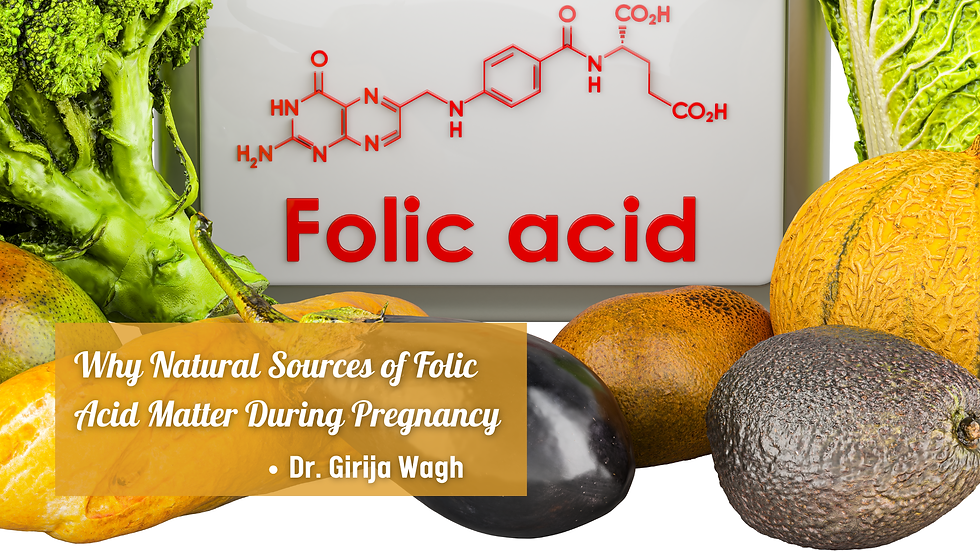Why Natural Sources of Folic Acid Matter During Pregnancy
- Dr. Girija Wagh

- Nov 20, 2025
- 2 min read

Folic acid is one of the most essential nutrients during pregnancy, especially in the early months when your baby’s brain and spinal cord are developing rapidly. While supplements are routinely prescribed, getting folic acid from natural food sources has unique benefits that support overall maternal health.
Why Folic Acid Is Important?
Folic acid (or folate, in its natural form) helps in the formation of healthy red blood cells and reduces the risk of neural tube defects in the developing baby. Because these structures begin forming in the first few weeks—often before a woman realizes she’s pregnant—maintaining good folate levels is crucial.
Best Natural Sources of Folic Acid
Nature provides folate through a vibrant variety of foods. Some of the richest sources include:
Green leafy vegetables such as spinach, methi, lettuce, and kale
Colourful vegetables like carrots and beetroot
Fresh fruits including oranges, papaya, and bananas
Berries, which not only contain folate but are also packed with antioxidants
These foods deliver folate in a form that the body readily recognizes and uses.
Absorption: The Most Overlooked Factor
Consuming folate-rich foods is important, but the real key lies in how well your body absorbs the nutrient. For folic acid to perform its vital functions, it must be properly digested and absorbed in the intestines.
Certain habits can interfere with this process:
1. Over-processed Foods
Highly processed foods lose a significant amount of their natural nutrients during manufacturing. They may fill the stomach, but they don’t support micronutrient needs. Excessive consumption of processed food can reduce the overall quality of your diet, leaving less room for fresh, folate-rich options.
2. Poor Food Handling
Improper washing or overcooking vegetables can reduce folate content. Since folate is a water-soluble vitamin, it can be easily destroyed by heat or lost into cooking water.
How to Maximize Folate Intake
A few simple practices can help ensure you get the most natural folate from your meals:
Choose fresh produce whenever possible
Wash vegetables well but avoid soaking them for long periods
Use cooking methods that preserve nutrients, such as steaming
Include a daily portion of green leafy vegetables
Balance your meals with fruits, colourful vegetables, whole grains, and lentils
The Bottom Line
Natural folic acid, when consumed through fresh and well-prepared foods, supports better absorption and contributes to healthier maternal nutrition. While supplements remain an important safety net during pregnancy, your everyday diet plays a powerful role in maintaining optimal folate levels.
A colourful plate is not just visually appealing — it’s a simple, effective way to nourish both mother and baby.







Comments